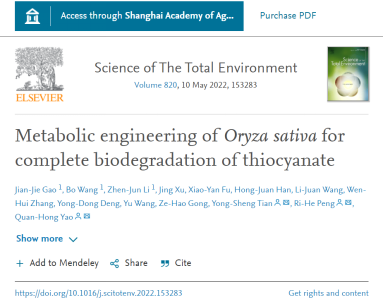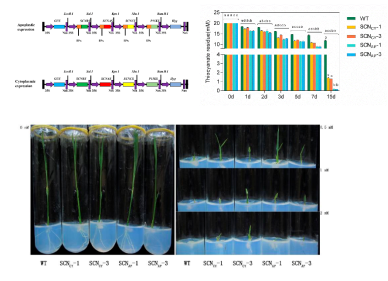Metabolic Engineering of Oryza Sativa for Complete Biodegradation of Thiocyanate
Recently, the agricultural synthetic biology team led by Prof. Quanhong Yao and Prof. Rihe Peng from the Biotechnology Research Institute, Shanghai Academy of Agricultural Sciences, successfully constructed rice that can degrade thiocyanate completely through metabolic engineering method. The results were published in Science of The Total Environment (IF 7.963).

Industrial thiocyanate (SCN-) waste streams from gold mining and coal coking have caused serious environmental pollution worldwide. Phytoremediation is an efficient technology in treating hazardous wastes from the environment. However, phytoremediation of SCN- is low efficient because plants lack SCN- degradation enzymes. In this study, the thiocyanate hydrolase module was assembled correctly in rice seedlings and showed SCNase activity.The engineered rice seedling has endowed the ability to counteract the SCN- phytotoxic and completely degraded thiocyanate in coking wastewater. The engineered rice seedling has endowed the ability to counteract the SCN- phytotoxic and completely degraded thiocyanate in coking wastewater. This study suggests that grafting the thiocyanate hydrolase module into plants is an efficient strategy for rapid phytoremediation of thiocyanate in the environment. The most obvious finding from this study is that the apoplastic expression system is more efficient than the cytoplasm expression system in the phytoremediation of thiocyanate. At last, the research has also shown that the secreted thiocyanate hydrolase from engineered rice plants does not influence rhizosphere bacterial community structures.

Dr. Jianjie Gao wrote this paper and the corresponding authors were Prof. Quanhong Yao, Prof. Rihe Peng and Prof. Yongsheng Tian. This research was supported by the National Natural Science Foundation of China, Shanghai Agricultural Commission, Shanghai Science and Technology Commission, and the Outstanding Team Program of Shanghai Academy of Agricultural Sciences.
DOI:10.1016/j.scitotenv.2022.153283
